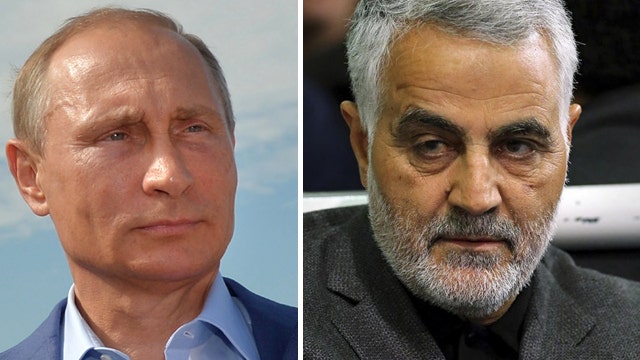As the Pentagon warily eyes a Russian military build-up in Syria, Western intelligence sources tell Fox News that the escalated Russian presence began just days after a secret Moscow meeting in late July between Iran's Quds Force commander -- their chief exporter of terror -- and Russian President Vladimir Putin.
Fox News has learned Quds head Qassem Soleimani and Putin discussed such a joint military plan for Syria at that meeting, an encounter first reported by Fox News in early August.
"The Russians are no longer advising, but co-leading the war in Syria," one intelligence official said.
The Quds Force is the international arm of Iran's Revolutionary Guard, involved in exporting terrorism to Iran's proxies throughout the Middle East including Lebanon, Syria, Iraq and Yemen.
Intelligence sources told Fox News that -- in addition to the previously reported arrival of nearly 50 Russian marines, 100 housing units and armored vehicles delivered by a stream of massive Antonov-124 Condor military transport aircraft and two Russian landing ships in Syria -- the Russians have delivered aviation, intelligence and communications facilities to deploy a powerful offensive force.
Officials who have monitored the build-up say they've seen more than 1,000 Russian combatants -- some of them from the same plainclothes Special Forces units who were sent to Crimea and Ukraine. Some of these Russian troops are logistical specialists and needed for security at the expanding Russian bases.
"Imagine how the Americans came to Iraq and Afghanistan. It's the same kind of build-up. They bring everything, they build everything they need," the intelligence official said.
The shadowy Iranian commander Soleimani visited Moscow from July 24-26 -- just 10 days after the nuclear deal was announced, despite a travel ban and U.N. Security Council resolutions barring him from leaving Iran. He met with Russian Defense Minister Sergei Shoigu and Putin to discuss arms deals. But Fox News has since learned that the Russian and Iranian leaders were also discussing a new joint military plan to strengthen Syrian President Bashar Assad, a plan that is now playing out with the insertion of Russian forces in Syria.
There are indications that Soleimani is not only involved in the Russian build-up in Syria, but may be leading the operation, though he has not been seen in Syria recently.
The Russians want to protect their interests in Syria. When the Syrian civil war began in 2011, the Russians had $4 billion in outstanding arms contracts with the Syrian government. The Russian Navy has maintained a base in Syria since the 1970s. This week, an image also surfaced purporting to show Nusra Front fighters standing by a Russian-supplied aircraft at a captured Syrian air base.
U.S. defense sources tell Fox News that most of Russia's heavy military equipment has arrived by sea onboard Russian amphibious transport ships. Those ships began arriving in the Syrian port of Tartous in recent days. U.S. officials have confirmed a total of eight military cargo planes from Russia landed in the past few days outside Latakia, a port city on the Mediterranean, becoming an almost daily occurrence.
Onboard those vessels: Russian armored vehicles, tanks, helicopters, unmanned drones that can be armed and used for intelligence gathering. Western intelligence sources also confirm that the Russians have sent a mobile air traffic control system, communication/listening units, and pre-built housing units.
Fox News has learned that the Russian units include members of the Airborne Rifle brigade, the equivalent of U.S. Army Rangers.
The reason that the Iranians are increasingly concerned about Assad's future is that they do not want a situation in which the Islamic State makes its way to Lebanon unchallenged, posing a threat to Iran's proxy Hezbollah, according Western sources. This makes the Iranians natural allies of the Russians.
Iran, these sources say, wants Syria to serve as its buffer zone between ISIS and Hezbollah.
Few think Russia's military build-up denotes an intent by Russia to join the U.S.-led anti-ISIS coalition. Despite downplaying the reports last week, the State Department and Pentagon are now so concerned by Russia's presence that Secretary of State John Kerry called his Russian counterpart twice this week to express his misgivings about the escalating conflict.

























